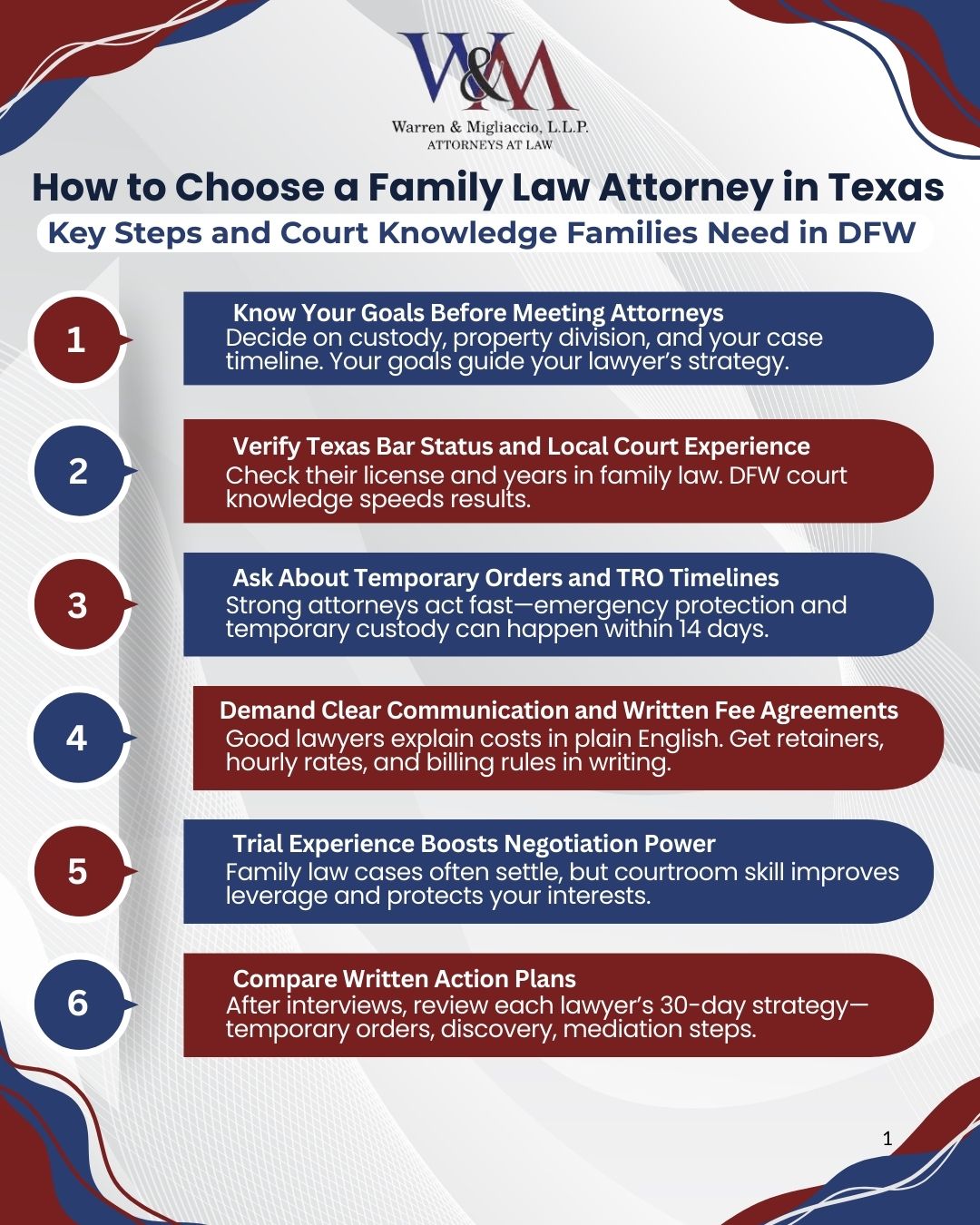To choose the right family law attorney in Texas, prioritize deep family-law experience and DFW courtroom knowledge, and confirm how they will handle temporary orders, costs, and communication so you understand next steps and realistic timelines, and feel confident the strategy fits your goals and family’s needs.
Quick Answer: How do I choose the right family law attorney in Texas?
In Texas, prioritize lawyers who know local standing orders and can seek temporary orders within 14 days; verify State Bar status, DFW courtroom experience, clear fees, and a written 30-day plan.
- Verify State Bar license, family-law focus, and DFW court familiarity
- Request a 30-day action plan and temporary-orders timeline
- Compare fees, response times, and trial record before hiring
Finding the right family law attorney means checking Texas experience and DFW court knowledge. Make sure they communicate clearly about attorney’s fees and have a solid plan for temporary orders, which last until the court issues final orders. Interview at least two lawyers. Ask how they handle child custody and divorce cases under Texas law. Get their action plan for your first 30 days. Temporary orders can protect your kids and money within 14 days.
7 Quick Steps to Choose Your Attorney:
- Know your goals (custody schedule, property, timeline)
- Check Texas Bar status and years of family law experience
- Ask about temporary orders and TRO timelines
- Make sure they know DFW courts and local rules
- Get fee details in writing
- See how fast they respond to you
- Compare written plans before choosing
What “Right Attorney” Means for Texas Families
The skilled family law attorney knows Texas law and DFW courts. They explain things clearly and help you plan your budget. You need someone who uses plain English and tells you what to really expect. Most importantly, you should feel comfortable and trust your divorce attorney, as family law cases often involve deeply personal legal matters. It is essential that you feel comfortable working with your attorney throughout the legal process, as effective communication and trust are key to a successful outcome.
Texas uses different words than other states. “Conservatorship” means who makes decisions about your kids – what other states call custody. “Possession and access” means your parenting schedule. When it comes to property division, property gets split in a “just and right” way, not always split 50/50.
Your goals matter most. Whether you’re protecting kids from violence, getting fair property division, or setting up parenting schedules, your attorney should match their plan to what you need. The best interests of the child control all custody decisions under Texas law. Always make sure you are working with a licensed and knowledgeable attorney who is authorized to provide legal advice in Texas.
People often ask if a “custody” lawyer is the same as a conservatorship lawyer in Texas. Yes – Texas uses conservatorship for decision-making and possession for parenting time, not “custody.”

Essential Credentials and Courtroom Experience
Years of Practice Make a Difference
Experienced family law attorneys have handled hundreds of cases like yours, including a wide range of family law matters such as divorce, child custody, property division, and other family law cases. Look for a divorce lawyer with at least five years focusing on family law. They need substantial family law work – ideally 50% or more of their family law practice, though 85% is even better. They should have references from judges and other lawyers. Experienced attorneys take continuing education classes and stay current on law changes. Attorneys who specialize exclusively in family law are often more knowledgeable than those who do not.
DFW Courtroom Knowledge Matters
Knowing the local courts helps your case. Dallas County courts are at 600 Commerce St. Collin County courts are at 2100 Bloomdale Rd. in McKinney. Each county has rules that start when you file. A family law lawyer who knows the judges and schedules works faster.
Verify Everything
Check any attorney’s license on the State Bar of Texas website. Look for any problems in their past. Make sure they really do family law. The American Bar Association also has directories you can check.
What This Means for You: Strong experience and local knowledge prevent expensive mistakes. They write better motions and know what DFW judges want to see.
Communication and Working Together
Clear Response Times
The best family lawyer should answer urgent legal issues the same business day. Regular questions should get answers in 24-48 hours. During busy times, expect weekly updates. Most law firms strive to respond promptly to client inquiries, and law firms often have established protocols for communication and billing. You should have one main contact person. Attorneys who are responsive during the initial contact are more likely to remain attentive throughout your case. An experienced attorney having a dedicated paralegal can enhance the efficiency of case management and support.
Written Strategy After Your Meeting
After you meet, get a written plan. It should list immediate steps like filing for temporary orders. It should show discovery deadlines and when you might go to mediation or trial. The plan should say who does what to keep costs down.
Attorneys bill for the time spent on each aspect of your case, so having a detailed written plan helps you understand and manage these costs with greater transparency.
Talking About Hard Topics
Be honest about domestic violence, drug problems, or mental health issues. Proven family violence can limit the other parent’s time with kids. It can stop them from getting joint custody. If the other parent is involved in domestic violence or raises objections during legal proceedings, their actions can significantly impact the court’s decision. It is important to address any concerns about the other parent with your attorney. If you’re not safe, talk about protective orders right away.
Related Resource: Can the Court Order Drug Testing or Evaluations in a Child Custody Case?
Case Study: Securing Emergency Orders and Safe Exchanges in 14 Days
We met a mother who was terrified. Her ex kept the children five days past his time and sent threats. The kids missed school. She was shaking and unsure what to do. We said we’d focus on safety and facts.
That afternoon we filed for a temporary restraining order and emergency temporary orders in Dallas County. We built a timeline, organized the texts, pulled attendance records, and proposed clear terms: return of the children, no harassment, a narrow geographic restriction, supervised visits, and police-station exchanges. We prepared her testimony and explained what the judge would expect.
At the hearing, we stayed on evidence and local rules. The court named her temporary primary conservator, ordered structured visitation and exchanges at the station, and the children returned to school within days.
Takeaway: In a crisis, hire counsel who moves fast, knows emergency orders and local practice, and tells you exactly which safety records and messages to bring.
Key Lesson
Use child-safety evidence. Get temporary orders fast. Give the court a schedule they can use today.

Understanding Legal Fees and Billing in DFW
Common Fee Structures
Most contested cases charge by the hour. You pay a retainer up front that goes in a trust account. The lawyer bills their time against it. Simple tasks like uncontested divorces might have flat fees. Some firms offer payment plans.
A private attorney typically charges fees for their services, and these fee arrangements can vary depending on the type of case. For example, in personal injury cases, attorneys often work on a contingency fee basis, where payment depends on a successful settlement or award. In family law, most cases are resolved through settlement rather than going to trial, and fee structures may reflect the likelihood of reaching a negotiated agreement outside of court.
What Costs Money
Lawyers bill for all services performed on your behalf. This includes phone calls, emails, writing documents, going to court, and travel. Most bill in six-minute chunks. Paralegal time costs less than lawyer time. Get billing details in writing. A good family law attorney will also provide detailed monthly invoices to ensure transparency in billing practices. You can negotiate with an attorney on their hourly rate or ask for different payment arrangements.
Controlling Costs
Save money by being organized. Prepare documents before meetings. Let paralegals do routine work. Try mediation when possible. Bring organized financial records. Fill out forms quickly. Use email efficiently. A strong support staff, including paralegals, enhances the efficiency of legal representation.
Cost-Saving Strategies:

Related Guide: Why Is Divorce So Expensive? Key Factors Explained
How to Research and Compare Attorneys
Start by looking for attorneys with substantial family law experience in North Texas. Before hiring a family law attorney, consider the hiring process carefully—evaluate their experience, communication style, and the quality of their staff relationships to ensure effective representation. Check the State Bar of Texas website to verify licenses and years of practice.
Read TexasLawHelp.org and Texas State Law Library guides. These help you understand your rights. Check if the lawyer works in your county – Dallas, Collin, Denton, or Tarrant.
Meet with at least two attorneys. Compare their fee agreements, custody strategies, and how they communicate. Comparing fee structures and experience with other attorneys can help you make an informed decision before you hire. Use this comparison table:

Your 15 Essential Consultation Questions
Bring these questions to every lawyer meeting. Before your initial consultation, prepare a list of questions and gather any documents you may need. During this first meeting, it is expected that you will share essential information, ask about the attorney’s experience, and discuss what you can expect from the process.
Experience and Expertise:
- How long have you done family law in Texas?
- What percentage of your practice is family law?
- How often are you in [my county] family court?
- Have you handled cases like mine?
Strategy and Approach: 5. What’s your plan for the first 30 days? 6. How do local rules affect my timeline? 7. Which Holley factors help or hurt my case? 8. How will you handle property division?
Communication and Team: 9. Who will I mainly talk to? 10. How fast do you return calls and emails? 11. Will you personally go to court for me? 12. How can paralegals save me money?
Fees and Timeline: 13. What retainer do you need? What’s your hourly rate? 14. What will this cost through mediation? 15. What should I do right now to protect my kids and money?
Related Guides:
- Get Professional Help: Texas Divorce Lawyer Free Consultation
- Divorce Consultation Checklist: Be Prepared

Recognizing Red Flags
Outcome Guarantees
No honest lawyer promises specific results. Texas law bases decisions on facts and what’s best for kids. Anyone guaranteeing custody or property splits is breaking legal professional rules. An effective attorney will provide realistic assessments of the case, even when the news is difficult to hear.
Poor Communication
Watch for missed callbacks, unclear answers, or messy files. If they can’t explain their plan clearly now, it won’t get better after you pay.
Don’t Know Texas Terms
Lawyers who only say “custody” without explaining conservatorship might not know Texas law. They should easily discuss standing orders, temporary orders, and local rules.
Unclear Fees
Get written fee agreements with hourly rates, retainer amounts, and billing rules. Avoid lawyers who can’t explain costs clearly.
What Texas Courts Actually Consider
Conservatorship and Possession Decisions
Courts put children’s best interests first. Judges look at each parent’s abilities, kids’ needs, home stability, any violence or drug problems, and support systems.
Impact of Domestic Violence
Proven family violence can end joint custody and limit visits. Courts might order supervised visits, safe exchange locations, or no contact at all.
Joint Managing Conservatorship
Texas assumes parents should share decision-making unless there’s a good reason not to. Family violence, child abuse, or other dangers can change this.
Property Division
Courts split community property in a “just and right” way. They consider earning ability, who caused the divorce, custody arrangements, and separate property. It’s not always 50/50.
Residency and Waiting Requirements
To file for divorce in Texas, one spouse must live here six months and in the county 90 days. Most divorces wait at least 60 days from filing to final decree.
Dallas County Standing Orders
Dallas County has automatic rules when you file. Both parties can’t hide assets, take kids from Texas, or cancel insurance. Breaking these rules hurts your case.
Related Guide: How to File for Divorce in Dallas County
Texas Case Law That Shapes Your Case
Holley v. Adams (1976) created factors judges still use. Courts look at what kids want, their needs, parent abilities, available programs, stability, and any harmful behavior.
Lenz v. Lenz (2002) guides moving cases. Courts balance why a parent wants to move, how it affects the other parent’s relationship, and benefits for the child.
In re J.A.J. (2007) explains how to change orders. You must prove things have changed and that new orders help the child.

Quick Answers to Common Questions
Texas divorce waiting period? 60 days minimum, with few exceptions.
Residency requirements? Six months in Texas, 90 days in the county.
What’s conservatorship? Texas word for decision-making about kids.
How do TROs work? Last 14 days, can extend once, give immediate protection.
Best-interest standard? Main rule for all kid decisions.
Property division rule? “Just and right,” based on many factors.
Where to check attorney experience? State Bar of Texas website.
Dallas courthouse? 600 Commerce St., Dallas, TX 75202.
Collin courthouse? 2100 Bloomdale Rd., McKinney, TX 75071.
How fast for temporary orders? Usually 14-30 days after filing.
Standing orders automatic? Yes, in Dallas and most DFW counties.
How many experienced family lawyers? Hundreds focus primarily on family law in Texas.
Common Mistakes That Cost Time and Money
Choosing Based on Price Alone
The cheapest hourly rate means nothing without experience and strategy. New lawyers take longer, make more mistakes, and might miss deadlines.
Ignoring Domestic Violence Issues
If you’re not safe, you need temporary orders fast. Waiting puts your family at risk and weakens your case. Talk about protective orders at your first meeting.
Breaking Standing Orders
Breaking county rules – even by accident – makes you look bad to the judge. It can hurt custody decisions. Learn these rules right away.
Accepting Unclear Fee Agreements
Get written agreements with rates, scope, team roles, and billing practices. Unclear agreements cause fee fights and surprise costs.
Missing Deadlines
The 60-day wait is just the minimum. Missing response deadlines or temporary order chances can delay your case months.
Special Situations Requiring Extra Care
Domestic violence cases need protective orders and safety plans right away. Courts can order supervised visits or no contact.
You may need specialized legal help for an adoption, paternity, or other family law matter, as these situations often require attorneys with experience in diverse family law issues. For example, you may need help from a fathers’ rights attorney to establish paternity and parental rights.
CPS involvement changes everything about timing and process. Work carefully between family and CPS courts.
Moving requests need proof the move helps the child while keeping the other parent’s relationship. Courts use Lenz factors with no automatic rules.
Grandparent or relative custody faces higher legal barriers. Parents have first rights that need clear evidence to overcome.
Complex property like businesses (i.e. LLCs) or stock options needs experts and detailed discovery. Start gathering records now.
Realistic Timeline and Budget Planning
Typical Case Phases
Most contested cases follow this path: Filing → Temporary Orders (14-30 days) → Discovery (2-4 months) → Mediation (3-6 months) → Trial if needed (6-12 months). Simple agreed divorces might finish in 61 days.
Why 60 Days Rarely Means 60 Days
The waiting period is just the legal minimum. Court schedules, discovery, and negotiations take time. Most mediated agreements happen in months 3-8. Trials take longer.
Texas Legal Timeline Requirements:

Tools and Resources for Your Case
Attorney Comparison Checklist – Download our comprehensive guide to compare attorneys.
Consultation Prep Worksheet – Free form for your goals and questions.
Budget Calculator – Simple tool for estimating costs.
Timeline Flowchart – Visual guide from filing to final orders.
Decision Tree – “Do I need temporary orders now?” Based on safety and urgency.

Frequently Asked Questions
Attorney Costs and Fees
How much does a family law attorney cost in Texas?
North Texas family law attorneys typically charge $250-$500 hourly with retainers from $2,500-$10,000. Uncontested divorces cost $500-$1,500 total. Contested cases with property division average $15,000-$30,000. Many firms offer payment plans or flat fees for specific services. Private attorneys can be expensive, with costs depending on factors like the economy and the complexity of the case.
Choosing and Evaluating an Attorney
What questions should I ask a family law attorney?
Ask about Texas experience, 30-day action plans, and who handles your case daily. Critical questions: Years practicing family law Temporary orders strategy Dallas/Collin local rule impacts Retainer and hourly rates Response time standards Recent cases like yours
What documents should I bring to my first consultation?
Bring key documents to focus strategy and control costs. Essential items: Prior court orders or TROs Tax returns and pay stubs Bank and retirement statements Child support payment history Property deeds and prenuptial agreements
Do I need a local DFW attorney who knows standing orders?
Yes. Dallas and Collin County standing orders apply automatically upon filing, affecting kids, finances, and conduct rules. Local attorneys navigate these requirements faster, avoid costly missteps, and set realistic timelines based on specific court schedules.
How do I verify a Texas attorney’s credentials?
Check the State Bar of Texas website for license status, disciplinary history, and board certifications. Verify five-plus years family law focus and regular appearances in your county. Board Certification (TBLS) signals advanced expertise through testing and ongoing education.
Texas Family Law Terminology and Processes
What’s the difference between custody and conservatorship in Texas?
Texas uses “conservatorship” for decision-making rights and “possession” for parenting time, not “custody.” Joint Managing Conservatorship means both parents share major decisions. The primary conservator determines the child’s main residence. Possession schedules determine when each parent has the children.
How long does a Texas divorce take?
Texas requires a 60-day minimum waiting period from filing to finalization. Most uncontested divorces finish at 61 days. Contested divorces typically take 6-12 months. You need six months’ Texas residency and 90 days in your county before filing.
Can I get temporary orders quickly in Texas?
Emergency TROs provide immediate 14-day protection and can extend once. Regular temporary orders hearings occur within 14-30 days of filing. These establish custody, spousal support, and property use while your case proceeds. Ask your attorney’s evidence-gathering timeline.
Custody and Family Violence
How does family violence affect custody in Texas?
Proven family violence creates a presumption against joint conservatorship under Texas Family Code 153.004. Courts may order supervised visitation, police station exchanges, or no contact. Document incidents immediately through police reports, protective orders, and medical records.
What are the Holley factors in Texas custody cases?
Texas judges use nine Holley factors to determine children’s best interests: Child’s preferences Emotional and physical needs Present dangers Parental abilities Available programs Parental plans Home stability Behaviors affecting relationships Explanations for concerning conduct Courts weigh all factors together.
Your Path Forward Starts Today
Protecting what matters most begins with choosing the right lawyer. North Texas families face unique challenges. You need local expertise, smart planning, and caring guidance.
Our experienced family law attorneys offer free consultations to help you understand your options. We’ll evaluate your case and plan your first steps. Our nearly 20 years serving Dallas, Collin, Denton, and Tarrant counties means we know these courts, judges, and procedures. Consultations allow potential clients to assess an attorney’s comfort and rapport.
Call our law office at phone number (888) 584-9614 or contact us online to request your free online consultation. Let’s build your path forward together.
Attorney advertising. Past results do not guarantee future outcomes. This information is not legal advice. Each case is unique. Communications are confidential.

